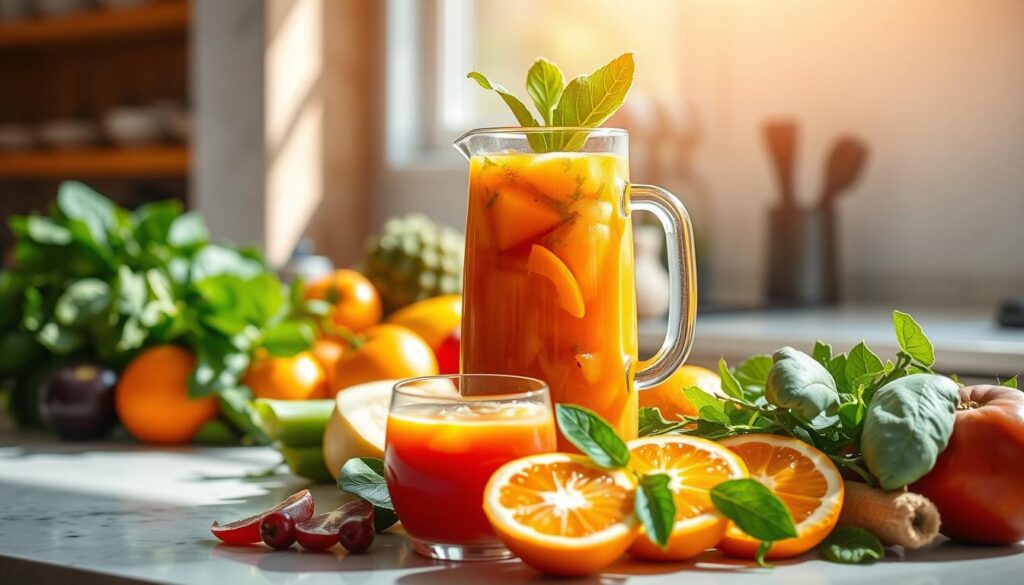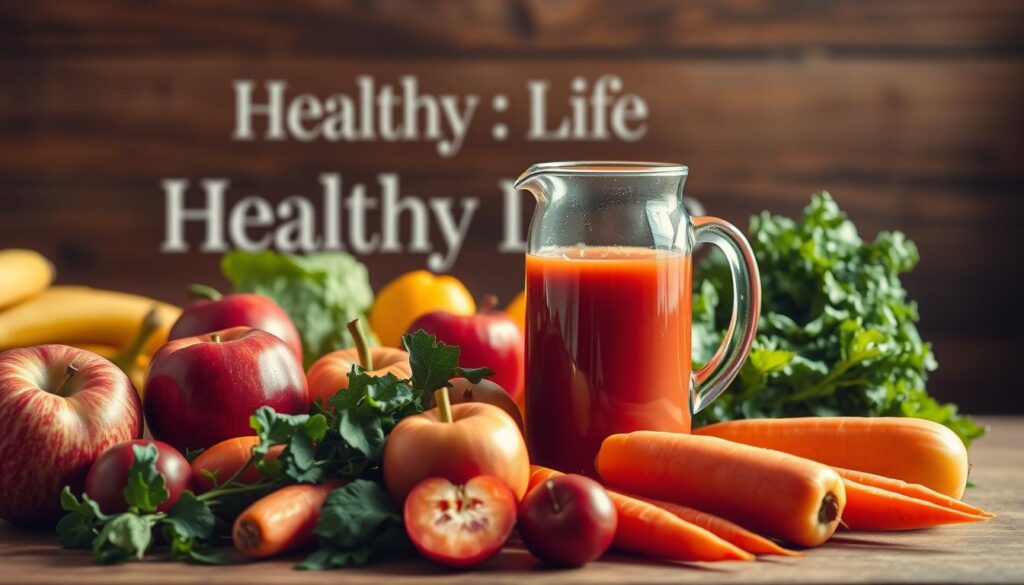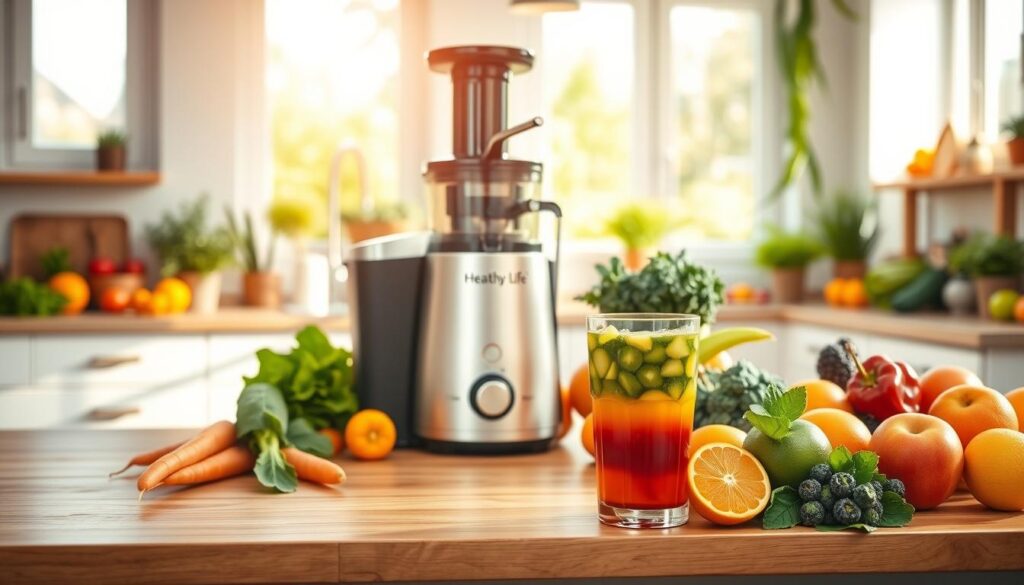As I reflect on my journey to a healthier lifestyle, I’ve come to realize the significant impact that juice has had on my overall wellbeing. Incorporating natural juices into my diet has been a game-changer, providing me with a boost of energy and enhancing my immunity.
I’ve discovered that certain juices are packed with antioxidants and nutrients that complement a balanced diet. Unlike processed beverages, these natural drinks offer numerous health benefits without the added sugars.
My personal experience has shown me that moderation is key, as even natural juices contain sugars. Nonetheless, top 5 juices for health I’ve found that the right balance has significantly improved my health.
Key Takeaways
- Discover my top favorite juices for a health boost
- Learn how natural juices can complement a balanced diet
- Understand the importance of moderation when consuming juices
- Find out how juices can enhance energy and immunity
- Explore the benefits of incorporating juices into your daily routine
The Power of Natural Juices for Wellness
Incorporating natural juices into my daily routine has been a game-changer for my overall wellness. Natural juices provide a concentrated source of essential nutrients, including vitamins, minerals, and antioxidants that support overall health.
One of the primary ways juices support overall health is by delivering a high dose of antioxidants, such as vitamin C and phenolic compounds. These compounds have been linked to a lower risk of chronic diseases, making juice a valuable addition to a healthy diet.
How Juices Support Overall Health
Juices are rich in various antioxidants and nutrients that provide numerous benefits. For instance, a diet high in antioxidants has been shown to reduce the risk of chronic diseases. By consuming juices made from a variety of fruits and vegetables, individuals can reap these benefits and support their overall health.
| Nutrient | Benefit | Juice Source |
|---|---|---|
| Vitamin C | Boosts Immune System | Orange Juice |
| Antioxidants | Reduces Oxidative Stress | Pomegranate Juice |
| Minerals | Supports Energy Production | Beetroot Juice |
My Journey to Discovering Healthy Juices
My journey to discovering the power of juicing began with research and experimentation. top 5 juices for health I was drawn to the idea of consuming a concentrated dose of nutrients and antioxidants through juice. As I explored different types of juices, I noticed significant improvements in my energy levels and overall health.

Through my experience, I’ve come to appreciate the difference between store-bought and freshly made juice. Freshly made juices offer maximum health benefits due to their higher nutrient content and lack of additives.
Why Incorporate Juices Into Your Daily Routine
Fresh juices have become a staple in my diet, providing a concentrated dose of essential nutrients and vitamins from fruits and vegetables. Incorporating juices into my daily routine has been a simple yet effective way to support my overall health.

Nutritional Benefits of Fresh Juices
Drinking fresh juices provides a convenient way to increase my intake of essential nutrients from fruits and vegetables. Various juices offer concentrated vitamins and phytonutrients that can supplement a healthy diet. For instance, fruit juice is rich in vitamins A and C, while vegetable juices are packed with antioxidants.
I’ve found that certain juices can target specific health concerns, such as immunity, digestion, or skin health. By incorporating a variety of fruits and vegetables into my juicing routine, I can reap the benefits of a broad spectrum of nutrients.
Juicing vs. Whole Fruits: Finding the Balance
While fruit juice can be a poor source of fiber and may spike blood sugar levels, it can still be a valuable addition to a balanced diet when consumed in moderation. I limit my intake to 1-2 cups (240-480 ml) per day and prioritize whole fruits and vegetables whenever possible.
To balance the potential drawbacks of fruit juice, I often choose vegetable-based juices or dilute fruit juice with water. This approach allows me to enjoy the nutritional benefits of juices while minimizing the negative impact on my blood sugar levels.
Top 5 Juices for Health That Transformed My Wellness
Through my experience with juicing, I’ve identified five key juices that have transformed my overall health and wellness. These juices have not only improved my physical health but also boosted my energy levels and enhanced my mental clarity.
Orange Juice: The Vitamin C Powerhouse
Orange juice is a significant source of vitamin C, an antioxidant that’s essential for skin health and iron absorption. I’ve made it my go-to morning juice for immune support. It’s also high in phenolic compounds like cinnamic, ferulic, and chlorogenic acids, which contribute to its numerous health benefits.
My Favorite Recipe and Preparation Tips
I prefer making my orange juice from scratch using fresh oranges. This ensures I get the maximum nutritional benefits without any added preservatives. To make it more palatable, I sometimes add a bit of ginger for an extra kick.
Beetroot Juice: The Natural Detoxifier
Beetroot juice is rich in inorganic nitrates, which have been shown to increase athletic performance and decrease blood pressure and heart disease risk. I’ve incorporated it into my routine to benefit from its natural detoxifying properties.
How I Include Beetroot Juice in My Routine
I mix beetroot juice with other juices to mask its earthy flavor. It’s become a staple in my post-workout routine, helping me recover and reduce inflammation.
Ginger Juice: Nature’s Digestive Aid
Ginger juice is rich in disease-fighting antioxidants like vitamin C and naringin. It’s helped me combat inflammation and improve digestion. I consider it nature’s digestive aid.
My Go-To Ginger Juice Blend
My favorite ginger juice blend includes ginger, apple, and a hint of lemon. This combination not only tastes great but also provides a boost of antioxidants and aids in digestion.
Apple Juice: The Antioxidant-Rich Classic
Apple juice is high in antioxidant compounds like flavonoids and chlorogenic acid, which help neutralize cell-damaging free radicals. I prefer cloudy apple juice over clear for its higher nutritional content.
Cloudy vs. Clear: Which I Prefer and Why
Cloudy apple juice contains more pulp and antioxidants than clear apple juice. This makes it a better choice for those looking to maximize the health benefits of their juice.
Pomegranate Juice: The Heart-Healthy Option
Pomegranate juice is rich in vitamin K, which aids blood clotting and heart health. It’s also high in the antioxidant anthocyanin, giving it a characteristic dark-red color. I’ve found it to be a heart-healthy addition to my diet.
My Tips for Maximum Nutritional Benefits
To get the most out of pomegranate juice, I recommend choosing 100% juice without added sugars. It’s also beneficial to consume it in moderation due to its high calorie content.
How I Incorporate These Juices Into My Daily Routine
I’ve found that incorporating the top 5 juices for health into my daily routine has greatly improved my well-being. To get the most out of these juices, I’ve developed a few strategies that help me stay consistent and maximize their health benefits.
Morning Juice Rituals for Energy
I start my day with a refreshing glass of orange juice, rich in vitamin C, to boost my energy levels. This morning ritual helps me feel invigorated and ready for the day ahead. I also enjoy a glass of apple juice on occasion, appreciating its antioxidant properties.
Post-Workout Recovery Blends
After a workout, I often reach for a rejuvenating blend of beetroot and ginger juice. The nitrates in beetroot juice support my cardiovascular health, while ginger aids in reducing muscle soreness. This combination is an excellent post-workout recovery drink.
Evening Detox Options
In the evening, I prefer a gentle glass of pomegranate juice, which supports heart health without interfering with my sleep. This detoxifying drink helps my body unwind and supports overnight cleansing processes.
To maintain a consistent routine, I prepare my juices in advance and store them properly. I also balance my juice intake with adequate water consumption throughout the day to stay hydrated. By being mindful of my overall hydration and adjusting my juice choices seasonally, I’m able to enjoy the health benefits of these top 5 juices for health.

By incorporating these juices into my daily routine and being mindful of my overall health, I’ve noticed significant improvements in my energy levels and overall well-being. Drinking 1-2 cups of juice per day, and opting for whole fruits and vegetables whenever possible, has become a sustainable part of my healthy lifestyle.
Important Considerations When Drinking Juices
When incorporating juices into your diet, it’s crucial to consider a few key factors to maximize their health benefits while minimizing potential drawbacks.
Sugar Content and Moderation
One of the primary concerns with juice consumption is its sugar content. Unlike whole fruits, juices lack fiber, which helps regulate blood sugar levels by slowing down the absorption of sugar into the bloodstream. Without fiber, the natural sugars in juice can cause a rapid spike in blood sugar and insulin levels.
To put this into perspective, consider the following comparison between common juices and their whole fruit counterparts:
| Juice Type | Sugar Content (per 100ml) | Fiber Content (per 100g) |
|---|---|---|
| Orange Juice | 8.4g | 0.2g |
| Whole Orange | 8.5g | 2.9g |
| Apple Juice | 9.6g | 0.1g |
| Whole Apple | 10.3g | 2.4g |
When to Choose Whole Fruits Instead
There are situations where choosing whole fruits is preferable to juices, particularly when fiber content is crucial for digestive health and managing blood sugar levels. For instance, if you’re looking to manage your weight or have digestive issues, whole fruits are generally a better option.
By being mindful of the sugar content in juices and choosing whole fruits when necessary, you can enjoy the benefits of juices while maintaining a balanced diet.
Conclusion
I’ve discovered that the right juices can be a powerful tool in maintaining health and preventing disease. By incorporating my top 5 juices into my daily routine, I’ve experienced numerous health benefits, including improved heart health and reduced constipation. To reap these benefits, I limit my juice intake to 1-2 cups per day. I encourage you to experiment with these juices and find your favorites, enjoying them as part of a balanced diet rich in whole fruits and vegetables for optimal health and antioxidants.

